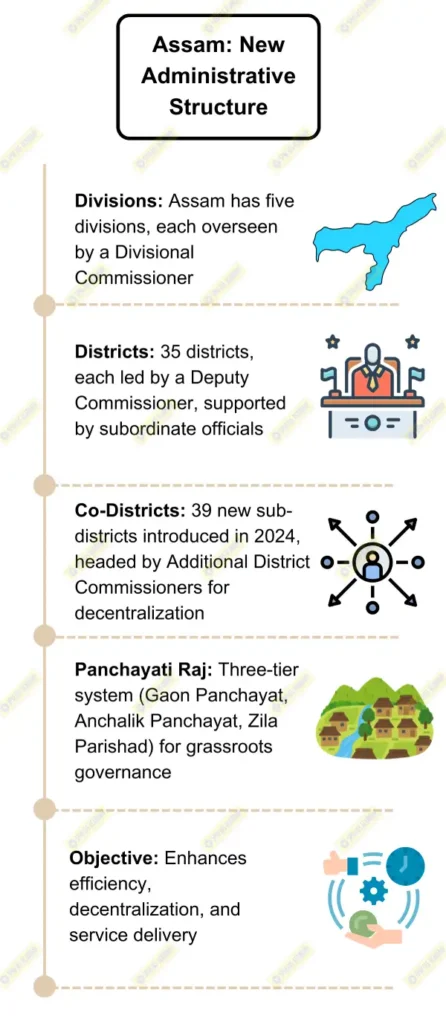Assam is witnessing a transformative shift in public administration, where the district is being positioned as the epicenter of governance. The Deputy Commissioner (DC), traditionally responsible for law and order, revenue collection, and routine administration, is now being envisioned as a facilitator of good governance, emphasizing accountability, inclusivity, and service delivery. This shift aligns with the principles of decentralization, participatory governance, and digital transformation to create a citizen-centric administration.
1. Governance Responsibilities of the Deputy Commissioner
A. Leadership and Collaboration
- Transitioning from an authority-driven role to becoming a team leader, fostering interdepartmental coordination for achieving developmental goals.
- Acting as a policy integrator, ensuring convergence of programs like PMAY, Jal Jeevan Mission, and Skill India at the district level.
B. Citizen-Centric Governance
- Prioritizing service delivery and responsive governance by strengthening grievance redressal mechanisms through digital platforms and public hearings.
- Engaging with citizens directly to understand local challenges, ensuring transparency, and enhancing trust in administration.
C. Disaster Preparedness and Mitigation
- As Assam is prone to floods and natural disasters, the DC’s role as a disaster manager will include creating district-specific disaster management plans, leveraging technology like GIS mapping, and ensuring real-time response to mitigate risks.
2. Development-Oriented Role of the Deputy Commissioner
A. Driving Localized Development
- Shifting focus to district-specific needs by customizing the implementation of government schemes and fostering equitable growth.
- Promoting inclusive development by engaging with Panchayati Raj Institutions (PRIs), civil society organizations, and the private sector for bottom-up planning.
B. Technology-Driven Governance
- Adopting e-governance tools like district dashboards for real-time monitoring of progress indicators, enabling data-driven decision-making.
- Promoting the use of blockchain, mobile governance, and digitized land records to enhance administrative efficiency.
The redefined role of the Deputy Commissioner in Assam signifies a paradigm shift towards responsive, inclusive, and development-oriented governance. Positioned as the fulcrum of district administration, the DC will embody the principles of accountability, participatory planning, and sustainable development. This evolution is set to create a governance model that is not only efficient but also citizen-centric, driving Assam toward transparent, equitable, and resilient administration.












